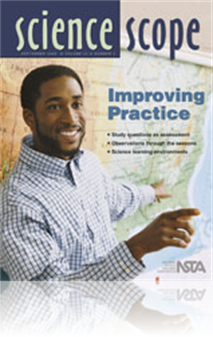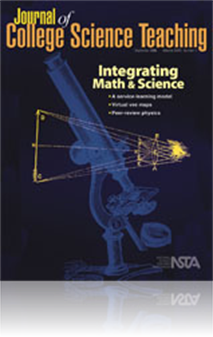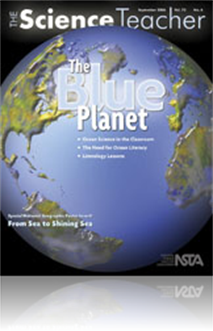All Resources
Journal Article
A Change in Seasons: Increasing Student Observation Skills
The ability to accurately observe and notice small details is a skill important to scientists. To help students develop this skill, have them record and share observations, successively focusing in on smaller, more precise details. When students obse...
Journal Article
A Message from the NSTA President: Quality Science Teachers -- Essential to America's Future
Our nation has begun to take science and the accomplishments of scientists in the United States for granted. The telephone, airplane, automobile, electric power, atomic fuel, vaccine, transplants, medicines--all of the discoveries of the past century...
Journal Article
The Gulf Stream and Density of Fluids
A few kilometers from the shores of Palm Beach County, Florida, the Gulf Stream current—a remarkable "river" within an ocean—makes its closest approach to land. To help students understand why and how the Gulf Stream flows, they study how Florida...
Journal Article
Science Shorts: All That Matters
The states of matter are a foundational property in physical science. Not only do they help students understand the physical world around them but also provide experiences on which to build later concepts, such as atomic structure and changes in mat...
Journal Article
Research and Teaching: Factors Influencing College Science Success
As college science teachers, our work is reflected in the achievement of our students. Their success in achieving course goals is our success, and their failure, ours. Predicting course grades is big business. From the perspective of college scien...
Journal Article
Science Sampler: A five-step approach to planning for technology in new science spaces
Cutting-edge technology such as interactive whiteboards, PDAs, and BlackBerry-enabled cell phones are becoming more common in the classroom, but rapid technological advances such as these present a challenge to those renovating or building new classr...
Journal Article
Podcasting, the practice of distributing multimedia files over the internet or a network for playback on computers or handheld electronic devices, offers an exciting range of possibilities for enriching instruction in science.This article will teach ...
Journal Article
Students may be slathered with SPF 30 sunscreen all summer at the beach or pool, but what do they know about ultraviolet (UV) light radiation and absorption? How could we help them find out the science behind this important health precaution? We fo...
Journal Article
Perspectives: Defending Inquiry
Inquiry-based lessons incorporate each of the science processes where most appropriate. Science is taught through inquiry in order to learn how scientists work, improve problem-solving skills, and improve student learning of content. Administrators...
Journal Article
Science Learning Environments and Action Research
A learning environment survey can be easily used in your science classroom to evaluate new instructional approaches, to spark enthusiasm, and to produce evidence showing that you are indeed becoming a reflective practitioner. Intellectual professiona...
Journal Article
Methods and Strategies: Think-Alouds in Inquiry Science
As teachers, we know that learning through an inquiry approach is helpful for our students. However, not all students are accustomed to learning through inquiry. Some have never experienced an inquiry investigation in science. How can we assist th...






